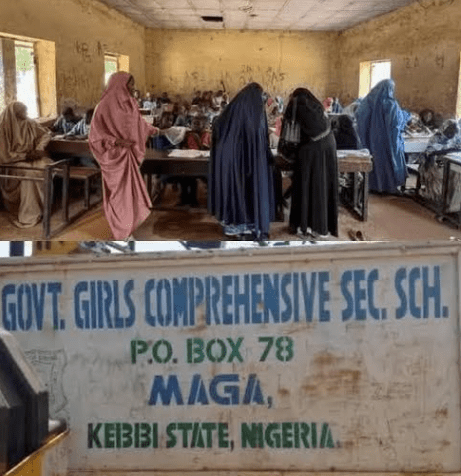Breaking News
Under Siege: 2,496 Students Kidnapped in 92 School Attacks Since Chibok Tragedy
Fresh mass kidnappings in Niger and Kebbi states have pushed Nigeria’s student abduction toll to 2,496 across 92 attacks since the 2014 Chibok tragedy. UNICEF, Save the Children and security reports reveal a worsening crisis, rising trauma, and urgent calls for stronger safe-school measures.

A fresh wave of school attacks last week — including two mass abductions in Niger and Kebbi states — has reignited painful memories of past tragedies and escalated concerns about the safety of students across Nigeria, particularly in the North.
On Friday, armed men abducted 303 students from a Catholic school in Niger State, barely five days after 25 students were kidnapped in Kebbi State. The incidents mirror a pattern that began in April 2014, when Boko Haram stormed a school in Chibok and abducted 276 girls, exposing the vulnerability of educational institutions nationwide.
Data from Save the Children International and UNICEF shows that between April 2014 and December 2022, about 70 school attacks occurred, leading to the abduction of over 1,680 students. More than 180 children were killed, 90 injured, and over 90 remain missing. At least 60 school staff were also seized during that period.
A Sunday Vanguard investigation further reveals that from January 2023 to November 2025, Nigeria recorded 22 more attacks targeting educational institutions, with 816 students kidnapped. These figures reflect only verified cases confirmed by security operatives and witnesses. Many incidents in remote communities across Niger, Zamfara, Sokoto, and Katsina are believed to have gone unreported.
If unreported cases are factored in, total incidents would surpass 92 attacks.
A Crisis That Evolved After Chibok
The Chibok kidnapping marked a major turning point. Boko Haram fighters invaded the Government Girls Secondary School at night, capturing 276 students and transporting them into forest hideouts. While some girls eventually escaped or were freed, UNICEF confirms that around 90 remain missing a decade later.
Rather than deter future crimes, the Chibok incident ushered in an era of mass abductions. As Boko Haram’s influence shifted, criminal gangs in the North-West adopted student kidnapping as a profitable venture. Communities in Kaduna, Katsina, Zamfara, Sokoto, Niger, and Kebbi began experiencing repeated attacks.
UNICEF reports that only 37% of schools in ten high-risk states have even basic early-warning mechanisms. Human Rights Watch describes the situation as “sustained by impunity”, noting that attackers often operate without fear of punishment.
Key Incidents Since 2014: Chibok to Kuriga
Chibok, April 2014
Armed militants stormed the Government Girls Secondary School at night, forcibly moving 276 girls into trucks. Global outrage followed, sparking the #BringBackOurGirls campaign. Many girls were rescued or released, but dozens are still missing.
Kuriga, Kaduna, March 2024
Gunmen invaded a school during morning assembly and kidnapped 287 pupils. The abductors reportedly demanded ₦1 billion in ransom. Security analysts noted the increasing profitability of student kidnappings.
Growing Psychological and Educational Impact
The consequences extend beyond statistics. Many students fear returning to school, while parents withdraw their children due to safety concerns. UNICEF estimates that over one million children have reported fear of attending school. In 2020 alone, 11,500 schools were shut down due to insecurity.
Survivors grapple with trauma, stigma, and disrupted learning. Reintegration programmes remain insufficient, leaving many without proper support.
Government Response: Strong Words, Inconsistent Action
After each major abduction, authorities condemn the attacks and promise action. While some operations have resulted in quick rescues, others have dragged on or yielded limited success. Analysts argue that Nigeria’s security response has lacked long-term planning.
Following last week’s Kebbi abduction, President Bola Tinubu directed the Minister of Defence to relocate to the state, but critics say such measures are often reactive.
State governments have also closed schools, strengthened security perimeters, and reviewed boarding policies. UNICEF and civil society groups continue pushing for proper implementation of safe-school standards, improved intelligence gathering, and functional early-warning systems.
Human Rights Watch warns that Nigeria risks normalising a crisis rooted in governance failures.
The Ransom Debate
Although the Federal Government denies paying ransom, evidence from families and communities suggests otherwise. Several cases point to negotiated payments or exchanged detainees:
- Chibok (2016 & 2017): Reports indicate about ₦3 million paid in instalments to free 103 girls.
- Kuriga (2024): SBM Intelligence reported vehicles moving cash to kidnappers; government denied ransom payment.
- Greenfield University (2021): Parents paid ₦180 million and ten motorcycles after earlier demands.
- Dapchi (2018): UN reports suggest payments were made.
- Kankara (2020): Reports cited ₦344 million demands; government denied paying.
- Tegina (2021): Kidnappers demanded ₦110 million.
- Afaka (2021): Reports indicated an exchange of detainees and ₦15 million payment.
Growing National Alarm
Stakeholders warn of disastrous consequences if Nigeria fails to protect children.
The President of the National Parent and Teacher Association, Haruna Danjuma, described the situation as alarming, saying parents can no longer trust school safety.
NANS South-West Coordinator, Comrade Alao John, called for urgent action to secure academic environments and curb the rising threat.
Experts insist that Nigeria must implement long-overdue reforms — better funding, secure school infrastructure, improved intelligence, stricter anti-ransom policies, and deeper community engagement — to prevent perpetual fear in classrooms across the North.
Timeline of Key Abductions (2014–2025)
(Full timeline retained as in original, listing all major attacks from Chibok 2014 to Niger 2025.)
Opinion Nigeria News










